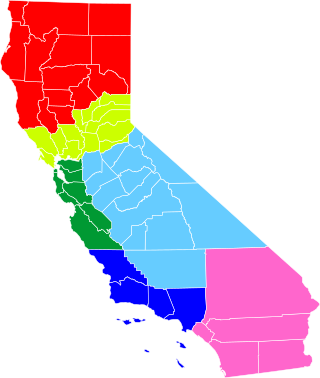Related Research Articles

A popular initiative is a form of direct democracy by which a petition meeting certain hurdles can force a legal procedure on a proposition. The hurdles the petition has to meet vary between countries, typically signatures by a certain number of registered voters.

California Proposition 187 was a 1994 ballot initiative to establish a state-run citizenship screening system and prohibit illegal immigrants from using non-emergency health care, public education, and other services in the State of California. Voters passed the proposed law at a referendum on November 8, 1994. The law was challenged in a legal suit the day after its passage, and found unconstitutional by a federal district court on November 11. In 1999, Governor Gray Davis halted state appeals of this ruling.

In California, a ballot proposition is a referendum or an initiative measure that is submitted to the electorate for a direct decision or direct vote. If passed, it can alter one or more of the articles of the Constitution of California, one or more of the 29 California Codes, or another law in the California Statutes by clarifying current or adding statute(s) or removing current statute(s).
In the politics of the United States, the process of initiatives and referendums allow citizens of many U.S. states to place legislation on the ballot for a referendum or popular vote, either enacting new legislation, or voting down existing legislation. Citizens, or an organization, might start an initiative to gather a predetermined number of signatures to qualify the measure for the ballot. The measure is placed on the ballot for the referendum, or actual vote.

Proposition 200, the "Arizona Taxpayer and Citizen Protection Act", was an Arizona state initiative passed in 2004 that basically requires: (a) persons to provide proof of citizenship to register to vote; (b) voters to present a photo identification before receiving a ballot at the polling place; and (c) state and local agencies to verify the identity and eligibility, based on immigration status, of applicants for non-federally mandated public benefits. The proposition also makes it a misdemeanor for public officials to fail to report violations of U.S. immigration law by applicants for those public benefits and permits private lawsuits by any resident to enforce its provisions related to public benefits. The requirement to provide proof of citizenship to register to vote was later ruled invalid in federal court.

The Michigan Civil Rights Initiative (MCRI), or Proposal 2, was a ballot initiative in the U.S. state of Michigan that passed into Michigan Constitutional law by a 58% to 42% margin on November 7, 2006, according to results officially certified by the Michigan Secretary of State. By Michigan law, the Proposal became law on December 22, 2006. MCRI was a citizen initiative aimed at banning consideration of race, color, sex, or religion in admission to colleges, jobs, and other publicly funded institutions – effectively prohibiting some affirmative action by public institutions based on those factors. The Proposal's constitutionality was challenged in federal court, but its constitutionality was ultimately upheld by the Supreme Court of the United States.
Defend Colorado Now (DCN) was a ballot initiative introduced in January 2006 to amend the constitution of Colorado to deny non-emergency public services that are not required by federal law to illegal immigrants in Colorado. It was similar to the recently approved Arizona Proposition 200 (2004), which denied public services to illegal aliens and California Proposition 187 (1994) which was declared unconstitutional by the Federal Appeals Court.
Amendment 44 was a proposed amendment to the state statutes submitted for referendum in the 2006 general elections in the U.S. state of Colorado. The amendment proposed the legalization of the possession of one ounce or less of marijuana for any person twenty-one years of age and over, as long as marijuana use does not occur in public. The measure was eventually defeated at the polls by 60–40 percent.
Ten referendums were held in Switzerland during 2008. The first two were held on 24 February on business tax reform and aircraft noise. A further three were held on 1 June on public information campaigns, naturalisation and health reform. The final five were held on 30 November on legalising cannabis, making the pension age flexible, restricting the right of appeal of associations against construction projects, amending the constitutional article on narcotics and eliminating the statute of limitations with respect to pornographic crimes against children.

California Proposition 6, also known as the Safe Neighborhoods Act and The Runner Initiative, is a statutory initiative that appeared on the November 2008 ballot in California. This proposition was rejected by voters on November 4 of that year.
Direct democracy refers to decision making or direct vote a proposal, law, or political issue by the electorate, rather than being voted on by representatives in a state or local legislature or council.

California Proposition 19 was a ballot initiative on the November 2, 2010, statewide ballot. It was defeated, with 53.5% of California voters voting "No" and 46.5% voting "Yes." If passed, it would have legalized various marijuana-related activities, allowed local governments to regulate these activities, permitted local governments to impose and collect marijuana-related fees and taxes, and authorized various criminal and civil penalties. In March 2010, it qualified to be on the November statewide ballot. The proposition required a simple majority in order to pass, and would have taken effect the day after the election. Yes on 19 was the official advocacy group for the initiative and California Public Safety Institute: No On Proposition 19 was the official opposition group.

The Massachusetts Medical Marijuana Initiative, appeared as the third question on the state's 2012 ballot as an indirect initiated state statute. The measure allows cannabis to be used for medical purposes in the state. The initiative—backed by the American Civil Liberties Union, the Massachusetts Patient Advocacy Alliance, and the Committee for Compassionate Medicine—was filed with proponents turning in the required signatures to the Massachusetts Attorney General's office by the August 3, 2011 deadline. Those signatures were needed for the required ten qualified voters who submitted the original petition to put forward the full text of the law they want enacted. The initiative passed with support from 63% of state voters.

Proposition 37 was a California ballot measure rejected in California at the statewide election on November 6, 2012. This initiative statute would have required labeling of genetically engineered food, with some exceptions. It would have disallowed the practice of labeling genetically engineered food with the word "natural." This proposition was one of the main concerns by the organizers of the March Against Monsanto in May 2013.

Proposition 34 was a California ballot measure that was decided by California voters at the statewide election on November 6, 2012. It sought to repeal Proposition 17, originally passed by voters in 1972, thus abolishing the death penalty in California.

Six Californias was a proposed initiative to split the U.S. state of California into six states. It failed to qualify as a California ballot measure for the 2016 state elections due to receiving insufficient signatures.

An Act to Prevent Cruelty to Farm Animals, more commonly known as Question 3, was the third initiative on the 2016 Massachusetts ballot. The measure requires Massachusetts farmers to give chickens, pigs, and calves enough room to turn around, stand up, lie down, and fully extend their limbs. It also prohibits the sale of eggs or meat from animals raised in conditions that did not meet these standards.

Cal 3 was a proposal to split the U.S. state of California into three states. It was launched in August 2017 by Silicon Valley venture capitalist Tim Draper, who led the effort to have it originally qualify on the November 2018 state ballot as Proposition 9, officially the Division of California into Three States initiative. Proponents of the proposal argued that dividing California into three states would provide fairer and more responsive governance for large regions outside of California’s major cities. In July 2018, the Supreme Court of California pulled it from the ballot for further state constitutional review. Draper officially stopped pushing for the measure soon after. On 12 September 2018, the court permanently removed the measure from all future ballots.

California Proposition 20 was a proposed initiated state statute on the ballot in the 2020 California elections. This initiative would have added more crimes to the list of non-violent felonies for which early parole is restricted, and would have required DNA collection for certain misdemeanors.
Federal referendums were held in Switzerland on 7 March, 13 June, 26 September, and 28 November 2021. Swiss referendums take three forms: popular initiatives, which are citizen proposals to create a new law and require 100,000 valid signatures on a petition to get on the ballot; facultative or optional referendums, which are citizen proposals to approve or reject a piece of existing law and require 50,000 valid signatures on a petition to get on the ballot; and mandatory referendums, which are required to revise the constitution, join an international organisation or introduce emergency federal legislation for over a year.
References
- ↑ "Archived copy". Archived from the original on 2007-03-10. Retrieved 2005-12-13.
{{cite web}}: CS1 maint: archived copy as title (link) - 1 2 3 4 "Public Bill". leginfo.ca.gov. Retrieved January 30, 2024.[ dead link ]
- ↑ "Immigrants' Rights". American Civil Liberties Union. Retrieved 2024-01-30.
- ↑ "California Secretary of State - Elections & Voter Information - Initiative Update". www.ss.ca.gov. Archived from the original on 4 October 2006. Retrieved 13 January 2022.
- ↑ "North County". San Diego Union-Tribune. Retrieved 2024-01-30.
- ↑ "California Secretary of State - Elections & Voter Information - Initiative Update". www.ss.ca.gov. Archived from the original on 4 October 2006. Retrieved 13 January 2022.
- ↑ "Archived copy" (PDF). Archived from the original (PDF) on 2018-08-29. Retrieved 2005-10-05.
{{cite web}}: CS1 maint: archived copy as title (link)